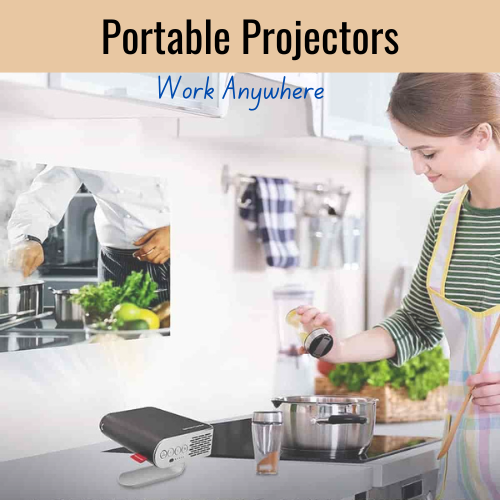Which is the best portable projector is the basic question of this article we are going to explore about today. A portable projector is a compact device that can display images, videos, presentations, and other media content onto a flat surface such as a wall or screen. Unlike traditional projectors that are typically large and stationary, portable projectors are designed to be easily transported and set up in various locations.
They are often used for business presentations, movie nights, gaming, educational purposes, and more. Portable projectors usually come with built-in speakers, various connectivity options (such as HDMI, USB, and wireless), and rechargeable batteries or power adapters for flexibility in use.
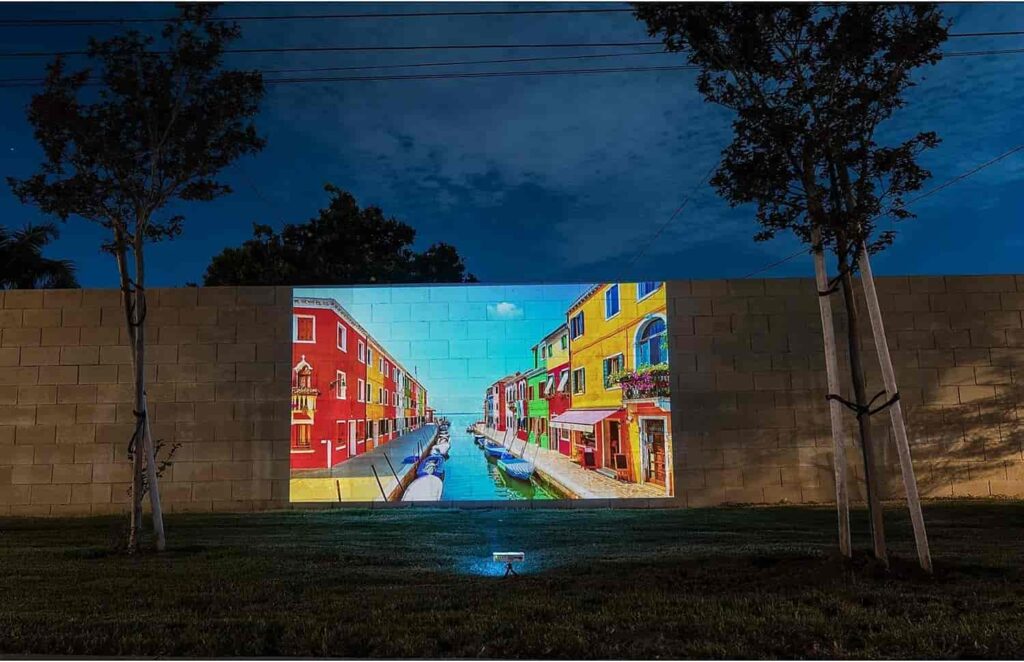
What is a Portable Projector
Portable projectors are made with special specifications and dimensions so they can be move or transported anywhere and anytime when required. Here’s a detailed breakdown of what a portable projector is:
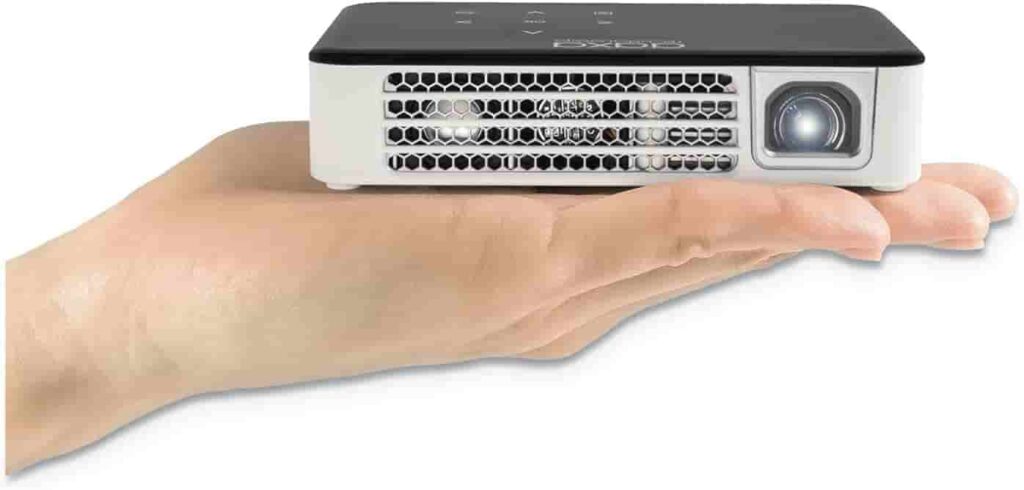
Compact Design
Best Portable projectors are designed to be lightweight and compact, making them easy to carry around. They are typically smaller in size compared to traditional projectors, allowing for greater portability.
Projection Capabilities
Despite their small size, best portable projectors are capable of projecting clear and vibrant images onto a flat surface, such as a wall or screen. They use various technologies, including LCD, DLP, or LED, to produce the projected image.
Versatile Applications
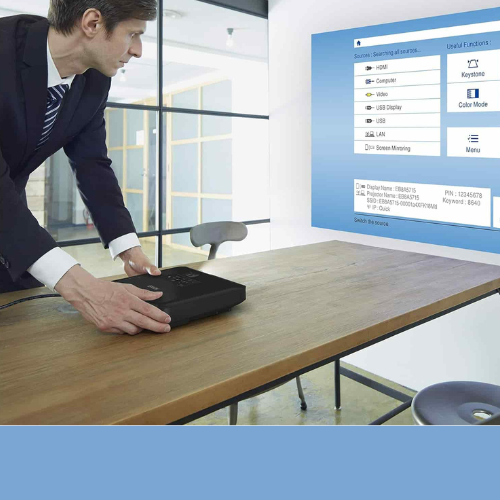
Business Presentations:
Best Portable projectors are commonly used in business settings for presentations, meetings, and conferences. They allow presenters to easily showcase slideshows, graphs, and other visual aids to a small or medium-sized audience.
Home Entertainment:

Portable Projector is also popular for home entertainment purposes, enabling users to enjoy movies, TV shows, and gaming on a larger screen than what is available on a typical TV or laptop display.
Educational Use:
Best Portable projectors are utilized in classrooms and educational settings to display educational videos, interactive lessons, and multimedia content to students.

Outdoor Activities:
Due to their portability, portable projectors are often used for outdoor movie nights, camping trips, and backyard gatherings, providing entertainment in various environments. Every body is trying to find the best portable projector for their use.
Connectivity Options
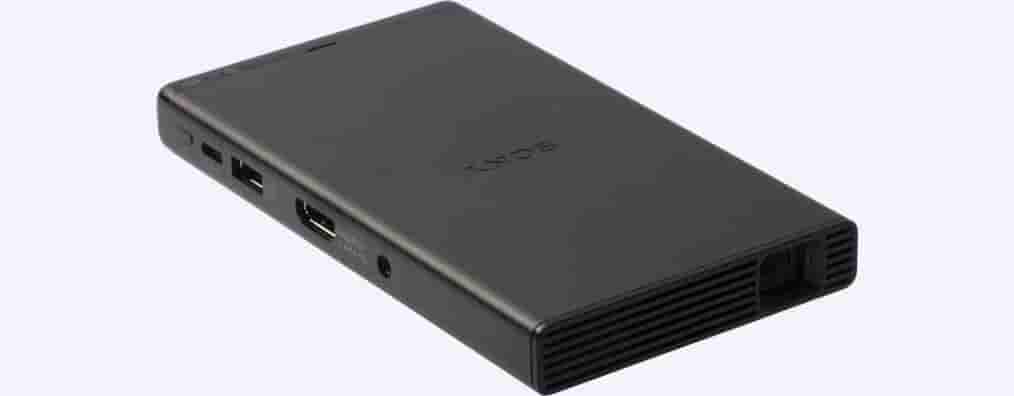
HDMI:
Many portable projectors come equipped with HDMI ports, allowing them to connect to a wide range of devices such as laptops, smartphones, tablets, and gaming consoles.
USB:
They often feature USB ports for direct playback of media files from USB flash drives or external hard drives.
Wireless:
Some of the best portable projectors support wireless connectivity options like Wi-Fi or Bluetooth, enabling seamless streaming from compatible devices without the need for cables.
SD Card:
Certain models include SD card slots for playing media files stored on memory cards.
Built-in Speakers
To provide audio along with the projected images, portable projectors typically come with built-in speakers. While these speakers may not match the audio quality of dedicated external speakers, they offer convenience for users who don’t want to carry additional audio equipment.
Power Source
Rechargeable Batteries:
Many portable projectors feature built-in rechargeable batteries, allowing them to be used without being plugged into a power source. This feature enhances their portability and versatility, especially in situations where power outlets are unavailable or inconveniently located.
Power Adapters:
Alternatively, portable projectors can be powered through AC adapters or DC power sources, providing flexibility in how they are used and ensuring continuous operation for extended periods.
User-Friendly Controls
Portable projectors typically come with intuitive controls and user-friendly interfaces, making them easy to set up and operate even for individuals with minimal technical expertise.
Adjustable Settings
They often offer adjustable settings for image quality, brightness, contrast, and keystone correction, allowing users to customize the projected image according to their preferences and the environment in which the projector is being used.
Overall, portable projectors offer a convenient and flexible solution for displaying multimedia content in various settings, combining compact design with versatile features to meet the needs of users ranging from business professionals to casual entertainment enthusiasts.
The Best Portable Projector
Determining the best portable projector can depend on various factors such as specific use cases, budget, features, and personal preferences. However, I can highlight a few top contenders that are often praised for their performance, features, and overall value. These can be said the best portable projector.
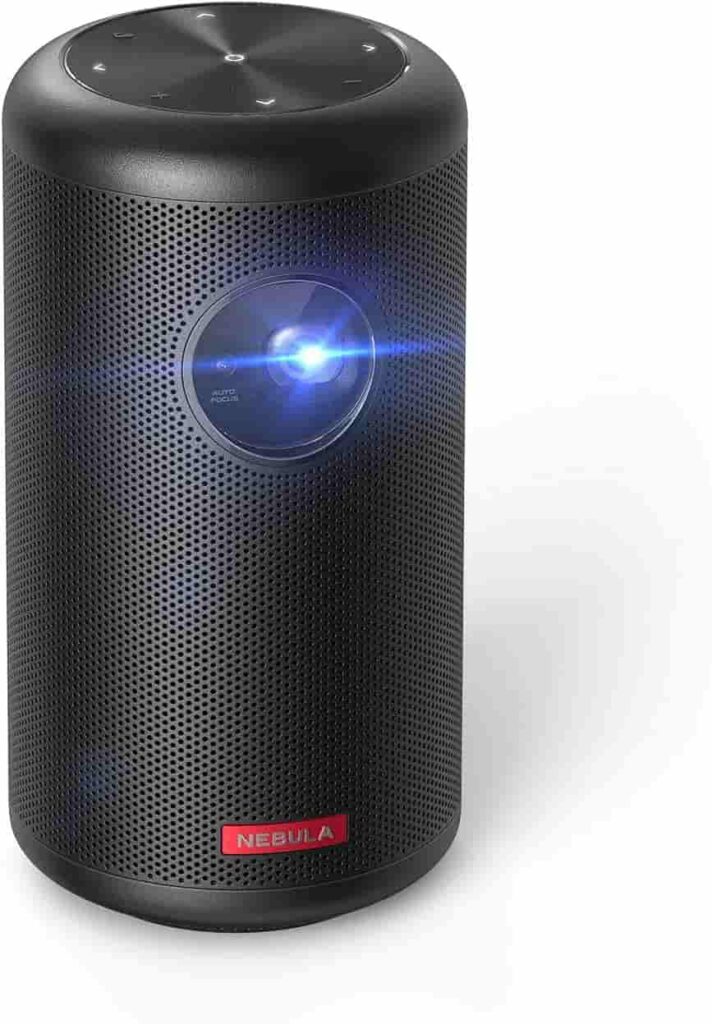
Anker Nebula Capsule II:
This one of the best portable projector offers a compact design with powerful features. It runs on Android TV, allowing users to access a wide range of streaming apps directly from the device. The Capsule II delivers sharp 720p HD resolution, 200 ANSI lumens brightness, and built-in 8W speakers for immersive audio. It also supports HDMI and USB connectivity, as well as wireless casting from smartphones and tablets.
ViewSonic M1 Mini Plus:
The ViewSonic M1 Mini Plus is another highly regarded portable projector known for its versatility and portability. It features a unique design with an integrated stand that doubles as a lens cover for protection during transport. The M1 Mini Plus offers WVGA resolution, 120 LED lumens brightness, and built-in Harman Kardon speakers for impressive sound quality. It supports HDMI, USB Type-C, and micro SD card connectivity, making it compatible with a wide range of devices.
BenQ GV1:
The BenQ GV1 is a stylish and compact portable projector that delivers excellent performance for both indoor and outdoor use. It features 480p resolution, 200 ANSI lumens brightness, and built-in 5W speakers with Bluetooth connectivity for enhanced audio options. The GV1 supports wireless casting via Wi-Fi and Bluetooth, as well as HDMI and USB-C connectivity for seamless compatibility with various devices.
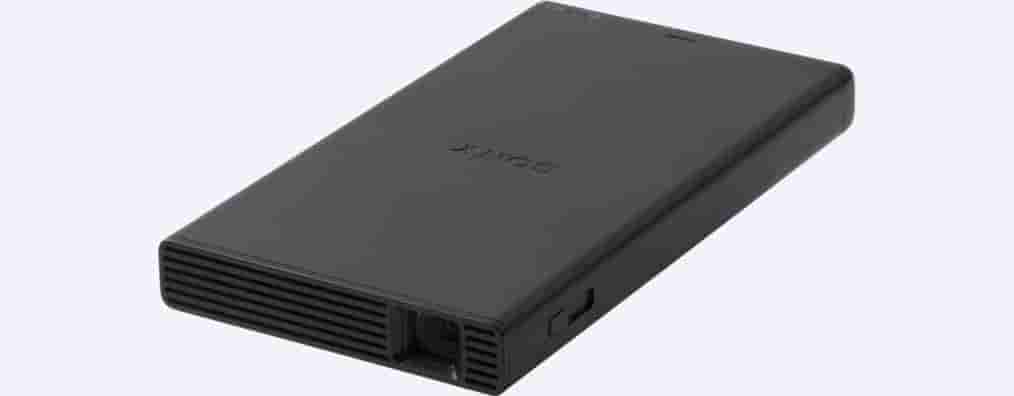
Sony MP-CD1:
Sony’s MP-CD1 is a highly portable projector known for its sleek design and impressive image quality. Despite its small size, it offers 854×480 resolution, 105 ANSI lumens brightness, and a battery life of up to 2 hours, making it ideal for on-the-go use. The MP-CD1 features HDMI and USB-C connectivity, as well as screen mirroring capabilities for easy connection to smartphones and laptops.
XGIMI MoGo Pro:
The XGIMI MoGo Pro is a feature-packed portable projector that combines high-quality image projection with smart functionality. It runs on Android TV, providing access to a vast library of streaming apps and games. The MoGo Pro boasts 1080p resolution, 300 ANSI lumens brightness, and built-in Harman Kardon speakers for immersive audio. It supports HDMI, USB, and Bluetooth connectivity, as well as wireless casting from compatible devices.
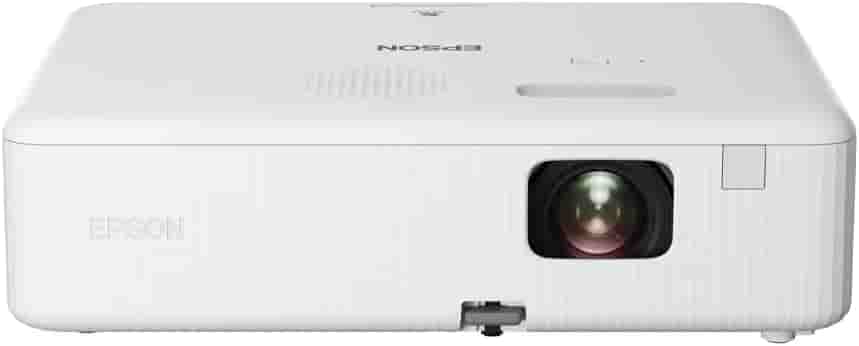
Epson:
Epson is a well-known name in the projector industry, offering a wide range of models for both home and business use. Their portable projectors are praised for their reliability, image quality, and innovative features. Epson’s portable projectors often feature high brightness levels, excellent color accuracy, and advanced connectivity options.
Optoma:
Optoma is another leading brand that specializes in projectors, including portable models suitable for various applications. Optoma’s portable projectors are recognized for their compact designs, high-resolution displays, and energy-efficient performance. They offer a diverse lineup of portable projectors catering to different needs, from business presentations to home entertainment.
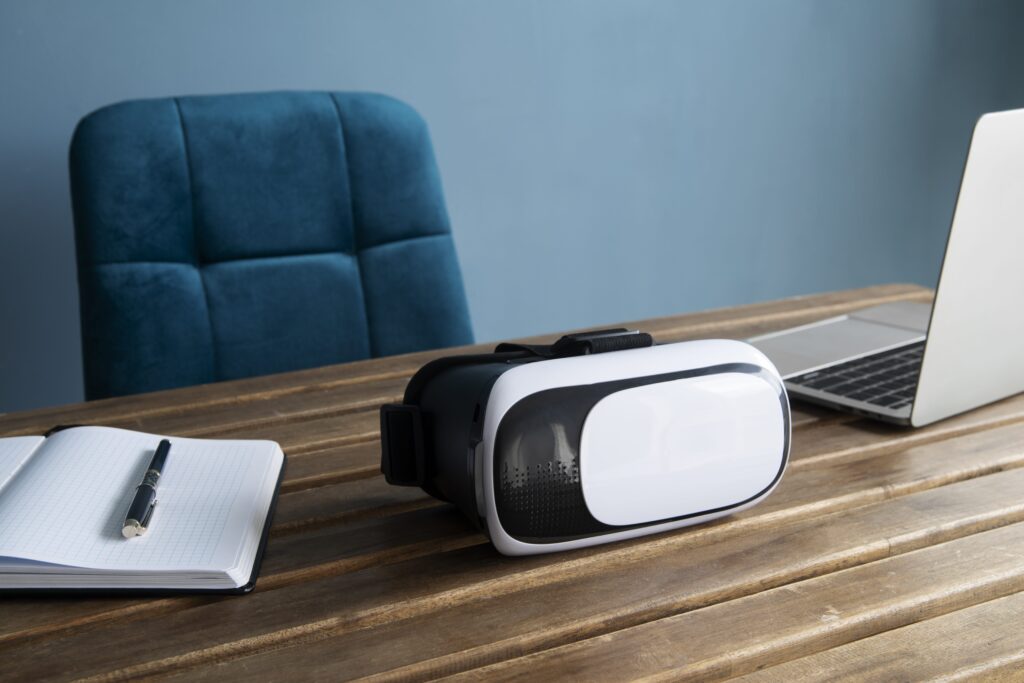
LG:
LG is a trusted brand known for its electronics and appliances, including projectors. LG’s portable projectors are lauded for their sleek designs, user-friendly interfaces, and impressive image quality. Many LG portable projectors feature built-in smart TV functionality, allowing users to stream content directly from popular apps without additional devices.
AAXA Technologies:
AAXA Technologies specializes in ultra-portable projectors designed for on-the-go use. Their projectors are compact, lightweight, and feature-rich, making them popular choices for business travelers, educators, and entertainment enthusiasts. AAXA projectors often offer a balance of performance, portability, and affordability.
Vankyo:
Vankyo is a rising star in the projector market, offering a range of budget-friendly portable projectors with impressive features. Vankyo projectors are known for their solid build quality, decent image quality, and intuitive interfaces. They cater to various needs, from basic multimedia presentations to immersive home theater experiences.
Nebula (by Anker):
Nebula, a subsidiary of Anker, specializes in portable entertainment projectors designed for modern lifestyles. Nebula projectors often feature smart capabilities, including built-in streaming apps, voice control, and wireless connectivity. They prioritize ease of use, versatility, and high-quality multimedia experiences.
BenQ:
BenQ is a reputable brand known for its high-performance projectors across different categories. Their portable projectors combine cutting-edge technology with user-friendly designs, delivering crisp image quality, flexible connectivity options, and reliable performance. BenQ’s portable projectors are suitable for various applications, from business presentations to home entertainment.
These brands consistently receive positive reviews and are trusted by consumers for their commitment to quality, innovation, and customer satisfaction in the portable projector market. When considering a portable projector, exploring offerings from these reputable brands can help you find the perfect fit for your needs and preferences.
These are just a few examples of portable projectors that are often considered among the best in their class. When choosing the right portable projector for your needs, be sure to consider factors such as image quality, brightness, connectivity options, battery life, and overall value for your budget.
The Best Models for Education Purpose

When selecting a portable projector for educational purposes, it’s important to consider factors such as image quality, connectivity options, portability, and ease of use. Here are some models that are well-suited for educational settings:
Epson PowerLite 1781W:
This lightweight and portable projector from Epson offers WXGA resolution (1280×800), 3,200 lumens of brightness, and a contrast ratio of up to 10,000:1, ensuring clear and vibrant images even in well-lit classrooms. It features HDMI and USB connectivity for easy setup with various devices, as well as wireless casting capabilities. The PowerLite 1781W also boasts a slim and compact design, making it convenient to transport between classrooms or for off-site presentations.
ViewSonic M1+:
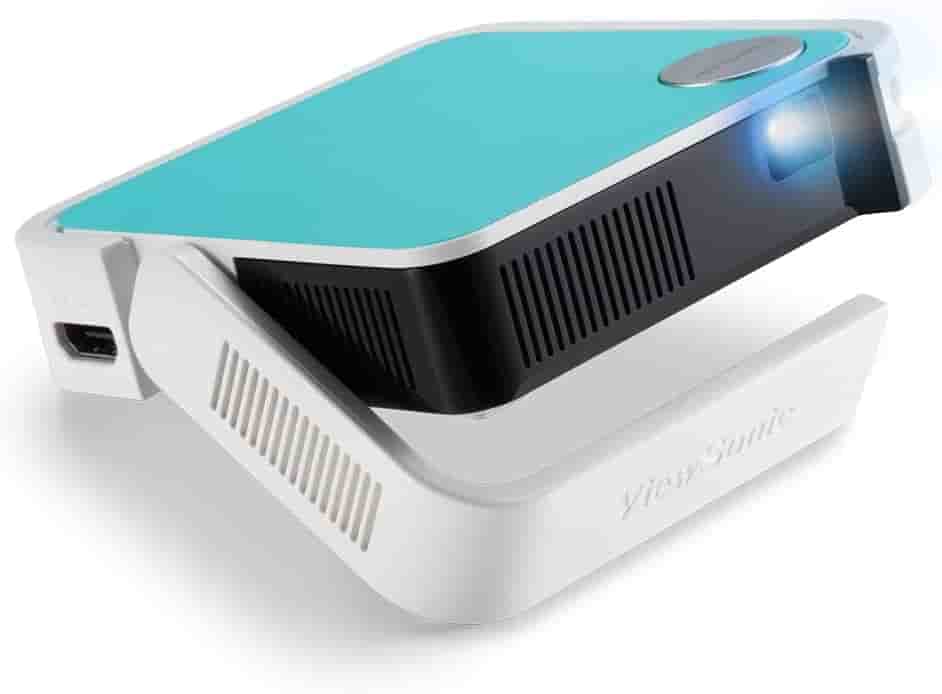
The ViewSonic M1+ is a versatile portable projector ideal for educational use. It features WVGA resolution (854×480), 300 lumens of brightness, and a built-in battery that provides up to 6 hours of continuous use on a single charge, making it perfect for classrooms without easy access to power outlets. The M1+ supports HDMI, USB-C, and wireless connectivity options, and its integrated Smart Stand allows for flexible projection angles and easy setup.
BenQ GS2:
Designed specifically for education and outdoor learning environments, the BenQ GS2 is a rugged and durable portable projector with IPX2 splash-proof and drop-proof capabilities. It offers HD720p resolution (1280×720), 500 ANSI lumens of brightness, and built-in Bluetooth speakers for immersive audio. The GS2 features wireless casting via Bluetooth and supports various connectivity options, including HDMI and USB-C, making it compatible with a wide range of devices.
AAXA P300 Neo:
The AAXA P300 Neo is a compact and portable projector suitable for educational presentations and multimedia content. It features WXGA resolution (1280×800), 420 LED lumens of brightness, and a built-in lithium-ion battery for up to 2.5 hours of projection time. The P300 Neo supports HDMI, USB, and microSD card connectivity, as well as wireless casting via optional accessories, providing flexibility in how content is displayed.
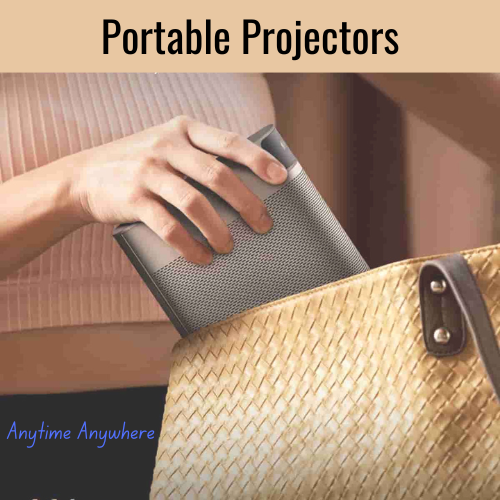
LG PH550:
The LG PH550 is a versatile portable projector that offers HD720p resolution (1280×720), 550 lumens of brightness, and built-in battery support for up to 2.5 hours of projection time. It features wireless screen sharing via Bluetooth and Wi-Fi, as well as HDMI and USB connectivity options. The PH550’s compact design and lightweight construction make it easy to transport between classrooms or for multimedia presentations on the go.
These models offer a range of features and specifications tailored to the needs of educators, including high-quality image projection, flexible connectivity options, portability, and ease of use, making them suitable choices for educational environments.
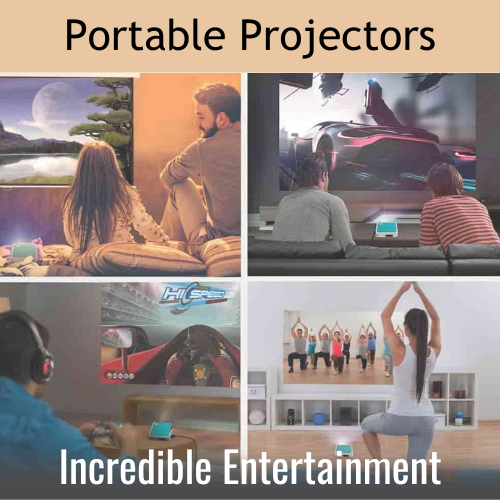
You can Contact Us for any question regarding this article.
FAQs Frequently Asked questions
What is a portable projector?
- A portable projector is a compact device that can display images, videos, presentations, and other media content onto a flat surface such as a wall or screen. Unlike traditional projectors, portable projectors are designed to be easily transported and set up in various locations.
What advantages may utilizing a portable projector offer?
- Portability: Portable projectors are lightweight and compact, making them easy to carry around for presentations, movie nights, and other events.
- Versatility: They can be used in various settings, including classrooms, boardrooms, living rooms, and outdoor spaces.
- Convenience: Portable projectors often come with built-in speakers, wireless connectivity options, and rechargeable batteries for hassle-free operation.
- Space-saving: Portable projectors eliminate the need for bulky equipment and large screens, making them ideal for small rooms or on-the-go setups.
What are the key features to consider when choosing a portable projector?
- Image quality: Resolution, brightness (measured in lumens), and contrast ratio.
- Connectivity options: HDMI, USB, Wi-Fi, Bluetooth, and compatibility with devices such as laptops, smartphones, and gaming consoles.
- Battery life: For portable projectors with built-in batteries, consider the duration of the battery life for uninterrupted use.
- Size and weight: Ensure the projector is lightweight and compact enough for easy portability.
- Built-in speakers: Evaluate the quality and volume of the built-in speakers for audio playback.
Can portable projectors display HD or 4K content?
- Yes, many portable projectors support HD (720p) or Full HD (1080p) resolution, allowing them to display high-definition content. Some premium models even offer 4K resolution for ultra-sharp image quality, although they may be larger and less portable.
Are portable projectors suitable for outdoor use?
- Yes, portable projectors are often used for outdoor movie nights, camping trips, and backyard gatherings. However, ambient light and environmental conditions can affect image visibility, so choose a projector with sufficient brightness for outdoor use, or plan to use it in a shaded area during daylight hours.
How do I connect a portable projector to my devices?
- Portable projectors typically offer various connectivity options, including HDMI, USB, Wi-Fi, and Bluetooth. Simply connect your device (such as a laptop, smartphone, or streaming stick) to the projector using the appropriate cable or wireless method, and select the corresponding input source on the projector’s menu.
Can I use a portable projector for gaming?
- Yes, many portable projectors support gaming consoles and devices via HDMI or wireless connectivity. Look for a projector with low input lag and decent refresh rates for a smoother gaming experience.
How do I maintain and clean a portable projector?
- To maintain optimal performance, regularly clean the projector’s lens and vents using a soft, dry cloth. Steer clear of utilizing abrasive or strong chemicals as they may harm the housing or lens. Additionally, store the projector in a cool, dry place when not in use to prevent dust buildup and prolong its lifespan.
How do I set up and use a portable projector?
- Setting up a portable projector typically involves connecting it to a power source, adjusting the focus and keystone correction, selecting the input source, and positioning it at an appropriate distance from the screen or wall. Many projectors come with user manuals or on-screen guides to help with setup, and the process usually takes just a few minutes.
Why is keystone correction necessary, and what does it mean?
- Keystone correction is a feature found in most projectors that corrects the trapezoidal distortion that can occur when the projector is not positioned perpendicular to the screen or wall. It ensures that the projected image appears rectangular and properly aligned, regardless of the projector’s angle or placement.
Can I use a portable projector without a screen?
- Yes, portable projectors can be used without a dedicated projection screen. They can project images onto any flat, light-colored surface such as a white wall, sheet, or even a blank ceiling. However, using a quality projection screen can enhance image brightness, clarity, and color accuracy, especially in well-lit environments.
What is the difference between LED and traditional lamp projectors?
- LED projectors use light-emitting diodes (LEDs) as their light source, whereas traditional lamp projectors use conventional lamps (such as halogen or metal halide bulbs). LED projectors tend to have longer lifespans, lower power consumption, and quicker startup times compared to lamp projectors. They also produce less heat and are generally more compact and portable.
How long do the bulbs or LEDs in portable projectors last?
- The lifespan of the bulbs or LEDs in portable projectors can vary depending on usage and environmental factors. LED light sources typically last longer than traditional lamps, with some LEDs rated for up to 20,000 hours of use or more. This translates to several years of typical use before requiring replacement, whereas traditional lamp projectors may need bulb replacements every few thousand hours.
Can I connect a portable projector to a smartphone or tablet?
- Yes, many portable projectors support wireless casting or screen mirroring from smartphones and tablets. This allows you to display content from your mobile device directly onto the projector’s screen without the need for cables. Alternatively, you can use HDMI or USB connectivity to connect your device to the projector.
Are portable projectors suitable for professional presentations?
- Yes, portable projectors are commonly used for professional presentations in business settings. Look for models with high brightness levels, sharp image quality, and flexible connectivity options to ensure a professional and engaging presentation experience.
.

